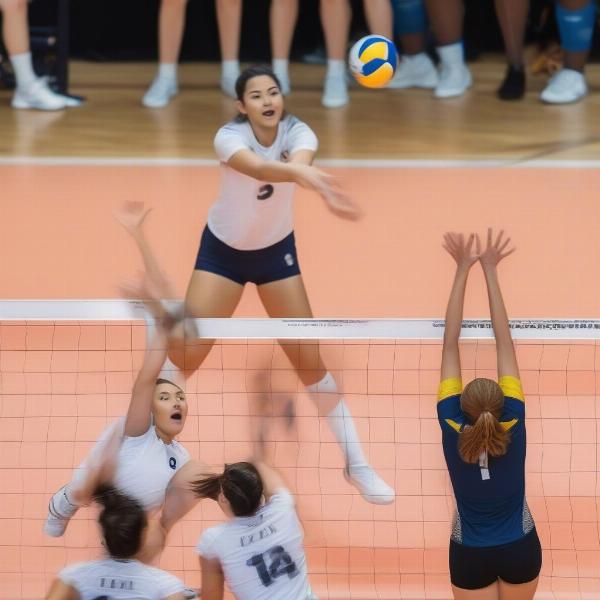Volleyball terminology can be confusing. Is it a game or a match? This article dives deep into the difference between a volleyball game and a match, clearing up the confusion and providing you with a comprehensive understanding of the terms used in the sport.
Decoding “Game” and “Match” in Volleyball
In volleyball, the terms “game” and “match” are often used interchangeably, leading to some confusion, especially for newcomers to the sport. However, they have distinct meanings. A game is a single unit of competition played to a predetermined number of points. A match, on the other hand, is a series of games played between two teams. Think of it like this: a game is a single battle, while a match is the entire war.
What Constitutes a Volleyball Game?
A volleyball game is played until one team reaches a specific number of points, typically 25, with a two-point advantage. So, if the score is 24-24, the game continues until one team leads by two points. This scoring system ensures a decisive winner for each game. The number of games required to win a match varies depending on the level of play.
 Volleyball Game Point
Volleyball Game Point
How Many Games Make a Volleyball Match?
Most volleyball matches are best-of-five games. This means the first team to win three games wins the match. However, some matches, particularly at lower levels or in leagues with time constraints, might be best-of-three, where the winner is the first team to win two games. Understanding this distinction is crucial for following the flow and strategic decisions within a match.
Why the Confusion Between “Game” and “Match”?
The confusion stems primarily from casual conversation and less formal reporting. In casual settings, people often refer to a whole volleyball competition as a “game,” even if it technically consists of multiple games within a match. This informal usage contributes to the blurring of the lines between the two terms.
Is it Always “Game” and “Match”? Alternative Terminology
While “game” and “match” are the most common terms, you might occasionally hear “set” used instead of “game.” This is more common in beach volleyball and some international competitions. So, a “three-set match” is equivalent to a “best-of-three games” match. Being aware of this synonym avoids further confusion.
Strategic Implications: Game vs. Match Strategy
Understanding the difference between game and match significantly impacts strategic planning. Coaches and players often employ different strategies for individual games versus the overall match. For instance, a team might strategically sacrifice a game to conserve energy or try out different player combinations, keeping the bigger picture of winning the match in mind.
 Volleyball Coach Discussing Strategy
Volleyball Coach Discussing Strategy
FAQs: Clarifying Common Queries
Here are some frequently asked questions regarding volleyball terminology:
- What is a “let” in volleyball? A let is a replay of a point due to an interruption, such as a net touch or a ball hitting the ceiling.
- What is an “ace” in volleyball? An ace is a serve that directly results in a point, untouched by the receiving team.
- What does “side out” mean? Side out refers to the receiving team gaining the right to serve after winning a rally.
- How long is a typical volleyball match? A match can last anywhere from an hour to over two hours, depending on the number of games and the closeness of the scores.
- What’s the difference between indoor and beach volleyball scoring? Beach volleyball typically uses a 21-point scoring system for games, while indoor volleyball mostly uses 25.
- What is a libero in volleyball? A libero is a specialized defensive player with unique rules, such as not being allowed to attack the ball above the net.
- Where can I find official volleyball rules? The official rules are published by FIVB (Fédération Internationale de Volleyball) for international play and by respective national governing bodies for national competitions.
Conclusion: Game, Set, Match!
So, is it a game or a match? Now you know the difference. A game is a component of a match, and understanding this distinction allows for a more nuanced appreciation of volleyball’s complexities. Whether you’re a player, coach, or spectator, clarifying this terminology enriches your volleyball experience. Share this article with fellow volleyball enthusiasts to spread the knowledge and enhance their understanding of the sport!

